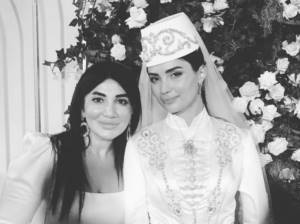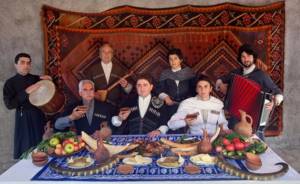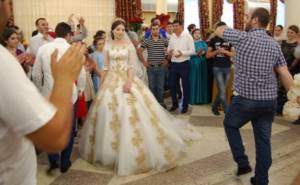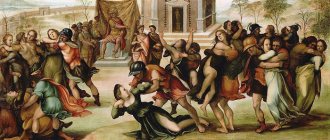The Republic of Dagestan is the most multinational region of the Russian Federation. In the “country of mountains”, more than a hundred nationalities live in close proximity. Each of these ethnic communities brought their own traditional values, gradually giving birth to that peculiar way of life that can be observed to this day. From village to village, customs change, remaining largely similar. Dagestanis revere traditions, preserving all the richness of folk culture in our age of change. A Dagestan wedding these days means unique age-old traditions, hospitality and a unique national flavor, adapted to modern realities.
Features of the culture of the Dagestan people
Dagestan has very strong traditions of hospitality. A set of rules that has existed for centuries prescribes hosts to be kind and attentive to guests. The homes of Dagestanis are always open to dear relatives, neighbors, and friends. Even a stranger who accidentally finds himself in the village is accepted as his own relative.
Children and youth are taught to listen to and honor their elders, respect their parents and protect their clan and family.
Despite the influence of Islam, adopted by the inhabitants of Dagestan since the rule of the Turks and Persians, women here have a special, caring attitude. Some researchers believe that initially matriarchy reigned in local tribes. The emphatically respectful, even naming in the third person, attitude of the wife towards her husband is adjacent to the prohibition for the weaker sex to engage in heavy physical labor. The polite wisdom of women can always cool the hot heads of male arguers. Also, in Dagestan it was not customary to wear a veil; on the contrary, girls and women dressed brightly, with numerous head decorations.
A wedding in Dagestan is not just a union of two loving hearts, it is an occasion for all relatives and friends to gather for a celebration of stunning scope. During this period, two separate families merge into a single whole. New relatives actively get to know each other and communicate. In the old days, local villages lived from wedding to wedding. All the surrounding villages gathered for this significant event, and guests came from remote areas. The wedding was celebrated in several stages, and the preparatory period began with the birth of children.
Acquaintance and conspiracy
In the old days, it was customary to persuade children from the cradle. And this is not a whim: with the restrictions that wedding traditions imposed, it was quite difficult to find a suitable couple in the region. Basically, this custom flourished among wealthy families. The father of the young groom gave a valuable thing as collateral, and the children were considered to be in agreement.
The most common was collusion between boys and girls in adolescence and adulthood. Senior relatives and parents were looking for the bride, including all their friends and neighbors. The girl had to demonstrate certain qualities: hard work, restraint of emotions, knowledge of etiquette. Physical health, the absence of deformities and mental illness among relatives, the origin and well-being of the family were also important. Before the wedding, the young couple may not have known each other at all.
In modern Dagestan, young people have the opportunity to make acquaintances on their own. But even now, boys and girls listen to the opinions of older relatives, and marriage without the blessing of their parents is unthinkable.
Another traditional way to get married was bride kidnapping. This move made it possible to avoid the huge costs of ransom and wedding arrangements, as well as to marry against the will of the chosen girl’s relatives. As a rule, refusal followed if the applicant for the daughter’s hand in marriage was lower on the social ladder, from an impoverished family, or from a family with which there was enmity. A girl who spent the night under the roof of a stranger was considered disgraced. If she managed to escape before dawn, then it was believed that the girl managed to defend her honor. If not, the relatives had no choice but to agree to an immediate wedding. However, enraged relatives could declare blood feud for the shame of their daughter and sister, which did not ease the fate of the unfortunate woman, who was losing hope of a worthy match. Bride kidnapping these days is prosecuted by law, and usually occurs by mutual consent, as a beautiful, stylized antique ritual.

Zaurbek Sidakov and Madina Plieva: getting to know each other
Discussions about the Olympic Games in Tokyo had to be postponed due to the pandemic. Athletes locked themselves in their homes, where they tried to keep in shape. Push-ups, jump rope, jumping, veranda and harnesses instead of a sparring partner - these were Sidakov’s training sessions at the height of the coronavirus. When the incidence subsided, the champion went to the mountains for a training camp with the North Ossetian team. “It was really hard. The pandemic made us all nervous,” Sidakov said about the months “in captivity.”
Last spring became a period of change for the athlete not only in his career, but also in his personal life - as it seemed then, for the better. Zaurbek Sidakov met a beautiful brunette Madina Plieva on the street while she was walking her dog. The first meeting took place at the end of April, and the couple had already planned a wedding for the beginning of August.

Madina Plieva admired her beauty in her bridal outfit. Photo: instagram.com/oksana_dzulaeva_/
Little is known about Madina - 25 years old, daughter from a wealthy family. The future husband, as his friends are now lamenting, decided to marry too hastily - he took advantage of the respite in his career to arrange his personal life. “We probably should have gotten to know each other better,” the guests of the scandalous wedding belatedly say, remembering that Zaur was almost never with the bride - he spent all his time traveling and training.
Preparation period
Since divorces are extremely rare in Dagestan, the choice of a soul mate is approached with all responsibility. As soon as the young man or his family decides on the candidacy of the future bride, at the family council they carefully evaluate the girl, her behavior and reputation, look at the well-being of the family, and make inquiries about her relatives. If everything suits you, they send matchmakers to the chosen one’s parents – the groom’s parents, older relatives or friends. The Avars, on the contrary, invite the girl’s father to the house. The matter is not limited to one visit: a decent girl cannot give an answer immediately, and there are also frequent cases of refusal when the groom does not suit the girl’s relatives or herself.
As soon as the issue is resolved positively, the groom’s mother puts rings and a bracelet on the bride’s hands, after which the girl is considered to have agreed. Next comes the betrothal ceremony.
Betrothal in Dagestan
The groom, accompanied by relatives, arrives at the girl’s house with gifts. Previously, there was a custom when these gifts, along with the girl’s dowry, were hung on ropes for everyone to see; in some villages it is still preserved, so it is not customary to skimp. On this day, not only engagement occurs. The parties agree on the amount of the dowry, bride price and kalym. Also, wedding days are set.
A characteristic feature of a wedding in Dagestan is the holding of two celebrations with an interval of a week. This custom is easy to explain: in the old days, with the adoption of Muslim customs, wedding feasts were held separately for men and women. Moreover, parents could not accompany their daughter and attend a feast at the house of the groom's parents. And I wanted to attend the wedding of my own blood. So they held separate feasts. At the appointed moment, the groom and his friends arrived at the “women’s” wedding and took the bride, accompanied by her unmarried sisters, to a new family life. Having lost its original meaning, the tradition has survived, undergoing changes. Now there are two weddings, each time gathering all the guests.
Dowry and bride price
Money for bride price and dowry begins to be collected from the birth of a child. Household supplies, fabrics, and decorations are also prepared for the girl. For the young man's wedding, parents must provide a luxurious feast and separate housing, gifts and money to buy the chosen one. The amount of ransom and dowry is not established: in each specific case, the parties agree according to their position in society and wealth. At the same time, it is not customary to demonstrate stinginess and greed.

Traditional outfits of young people
Modern newlyweds prefer the classics - white dresses, suits, or traditional vestments in folk style. Often brides appear in both versions, fortunately, a double celebration allows this. The requirements for the bride's outfit are quite strict. The dress should be long, elegant, emphasizing the grace and beauty of the girl. The fabric is chosen expensive, decorations are selected. Veils and bedspreads are not accepted in Dagestan.
For young men who want to pay tribute to traditional dances, a second, national outfit with a mandatory furry hat is also required. It is in this vestment that he will lead his chosen one in the fiery dance of the newlyweds.

“Oh, this wedding sang and danced”
Victor called his mother, told her and asked her to tell all his relatives that he would soon arrive with his bride. On September 26, the couple arrived from Moscow to Karachay-Cherkessia, to their native village of Besleney. The son introduced his companion to his mother.
- This is my fiancée Raina. We'll sign later, in Moscow, and we'll celebrate the wedding here. She is from Dagestan, from the village of Chontaul. Her relatives can’t come, gather all our people. “We’ll go for a walk,” Victor told his mother.
The bride stood nearby, smiled modestly, and hardly raised her eyes. As expected according to local customs, before the wedding Raina was taken to the house of relatives. She lived there for five days.
— Nice girl, modest. Victor made a good choice. And she passed the housekeeping inspection. He washes dishes and floors and cooks well. Today we went together to choose beautiful lingerie for her and bought a peignoir. Raina has a good figure. But, it seems to me, she needs to gain weight a little, she’s too thin,” unmarried young girls discussed the bride in the kitchen.
On the morning of October 1, Raina was noticeably nervous in front of the mirror. I didn’t quite like the hairstyle; the makeup seemed too pale. When she put on a white dress and threw on a veil, she looked at herself in the mirror for a long time. The groom arrived with a noisy company. Relatives and neighbors began to come to the house to congratulate the happy lovers. Women in the kitchen helped prepare for the evening feast.
Five decorated dark cars raced through the village: the bride and groom went to the central village of Khabez for a photo shoot. For beautiful pictures we stopped at the most expensive hotel complex “Adiyukh Palace”. For locals, the hotel complex is like Red Square for newlywed Muscovites.
“We just need to take a couple of pictures on the embankment.” There will be a banquet at our house. I would like a honeymoon room, but yours is a little expensive,” Victor told the employee at the reception.
The newlyweds were allowed to take photographs on the territory of the complex. The bride and groom took a dozen wedding photos. In the photo there is a beautiful couple - everything is as usual in wedding photographs, but only the young people are very tense. This is noticeable in almost all photographs. Here they are on the embankment of the Maly Zelenchuk mountain river, next to the beautiful lawns, on the bridge. One photo became special for them: Victor and Raina specifically asked to be photographed in front of a rocky mountain against the backdrop of the peak on which the tower of Princess Adiyukh stands.
Features of a modern wedding in Dagestan
At the request of the couple and their relatives, the wedding can be modest, according to Muslim customs, without alcohol and with separate tables for men and women. Or the usual one, noisy, with fun, dancing, music and a hearty feast. They usually celebrate either in the banquet halls of restaurants or in the courtyards of houses. The main requirement for the venue of the feast is that it must accommodate everyone.
Registration at the registry office is carried out during the second day of the celebration. Since the number of guests is prohibitive, preparing for wedding celebrations is a very responsible matter. Even just choosing a menu so that there is enough for everyone and the guests are satisfied is quite a difficult task. But there is, in fact, a double wedding, doubling the costs and preparation problems!

Wedding events
After the engagement, preparations begin for the celebrations. This is mainly done by parents. And the bride must arrange a house or apartment where the young family will live. The groom's side purchases the property. If, due to the financial situation of the newlyweds, it is planned to settle in the house of the groom’s parents, then the girl will decorate the allocated wing or rooms. In addition to the dowry for their daughter, parents purchase household appliances and furniture.
Celebration at the bride's house
Previously, under her stepfather's roof, a small farewell feast was organized for the girl to be married off. Nowadays, a full-fledged wedding is celebrated, which, however, has its own unique characteristics. Musicians are located on the roof of the house. From the very morning they begin to perform ritual songs reminiscent of anguished crying. At this time, the girl, amid the lamentations of her surrounding girlfriends, is preparing to leave her parents' house. She sings farewell songs and dresses in wedding attire.
By noon, a procession consisting exclusively of women leaves the groom's house. They carry treats, sweets, jewelry and hand-woven carpets. The groom and other men follow at a distance, singing traditional ritual songs. When guests enter the house, everything brought is put into a chest, which will then be sent with the young wife to a new place of residence. After this, the feast begins.

A girl's entry into married life
In old times, it was on this day or the day before that the wedding ceremony was held in the Islamic tradition. The groom himself, the mullah and the bride's representative, father or senior relative were present.
Nowadays, on the first day of celebrations, the girl’s mother and other relatives, crying and wailing, hand the newlywed over to a new family. However, this transfer is purely symbolic: the bride stays overnight in her father’s house.
Celebration at the groom's house
In the morning on the appointed day, the groom comes for his betrothed and takes her under his arm, into his home. The celebration itself begins after noon. It is on this day that competitions are held, young people boast to each other about their strength and dexterity, competitions and funny pranks are held. Dancing and congratulations follow one after another. At the same time, joint dancing is very rare - men have fun separately from women.

Interesting wedding customs of Dagestanis
The thousand-year-old culture of the Dagestan people is rich in traditions, signs and beliefs associated with weddings.
- The designated wedding celebrations should not coincide with major Muslim holidays or fasting days, or the birthdays of the couple and their parents.
- The mother of the young wife brings diluted honey to the newlyweds so that life is sweet and hassle-free.
- On the threshold of the girl's house, the groom is met by his betrothed's sister and performs a ritual dance.
- Before the newlyweds dance together, the bride must dance with every man present among the guests. He should not touch her, only describe circles and throw coins at her feet.
A special master of ceremonies keeps order at the wedding; he also conducts competitions, says toasts and monitors the performance of rituals.
Wedding feast and toasts
The law of hospitality says: no guest should leave hungry. And greetings and well wishes to the young are heard almost continuously. At the same time, the number of toasts does not at all mean a command to get drunk. On the contrary, excessive consumption of alcohol is severely condemned.
A toast is a rather long parable, the wisdom of our ancestors is often passed down from generation to generation. An experienced toastmaster remembers many such beautiful stories, designed to teach young people about life, to wish well-being and good relationships. Congratulations are also addressed to parents and friends, as well as everyone present. Any wedding guest can raise a glass and say a toast. The main condition is to observe the order and not shout down the speaker.
Songs, dances and entertainment
Of course, where would we be without the traditional Lezginka? A most beautiful dance, during which a young man shows his dexterity, prowess and strength, and a woman must demonstrate modesty and the ability to emphasize the dignity of her partner, and all this action is performed in chic traditional outfits! There is something to look at and show yourself from the most advantageous side. This dance combines the indomitable spirit of Dagestan men and the gentle flexibility of women. Everyone can and loves to dance it, from kids to gray-haired elders.
The dance events are opened by the designated main dancer, after which all interested men can join him. The order is determined by the transfer of flowers: as soon as one dancer gets tired, he passes the bouquet to another, and the applicant chosen from among the guests should not refuse one or two circles. Dancing for the female half of the guests is marked by an invitation to the groom's sister to dance. Only after her can the rest of the ladies enter the circle.
Dancing and singing at a Dagestan wedding are the main entertainment. They last from the beginning to the end of the festival. These include traditional national dances, ritual melodies, and modern popular compositions, and karaoke.
Wedding: day two
The second day takes place at the groom's house. He comes to his wife's house and takes her under his wing. But before picking up the bride, the groom is greeted by her sister, performing a national celebratory dance before the wedding. Afterwards, the girl’s mother gives the newlyweds a cup of honey to drink. This is a symbol of a happy family life.
It is on the second day that many noisy and fun events take place. Shooting in the air, songs and dances, competitions for guests. On the second day of a Dagestan wedding, Lezginka is the most popular favorite entertainment.
The celebration begins after 12 noon, when the groom brings the bride into the house. The holiday is accompanied by dancing, with men dancing separately from women.
The newlyweds also perform their first dance. But this event is preceded by another custom: the bride must dance with every man present at the wedding. But the dance looks like this: a girl dances, and a man spins around her, throwing money near her.
The entire wedding event is conducted by a toastmaster - a pre-selected relative. He holds competitions, makes toasts, and monitors the observance of traditions.
The beginning of family life
The morning after the second day of wedding celebrations means the girl’s transition to the status of a woman. She is allowed to take off the girl's scarf from her head. Guests come to the newlyweds, congratulations are again heard on the beginning of family life. People feast on treats from the bride's chest. And two related families exchange expensive gifts, strengthening the formed ties.
A Dagestan wedding is a magnificent celebration with beautiful music and wonderful dancing. Careful attitude towards folk traditions and family values makes the wedding celebrations of Dagestanis especially bright and memorable.










